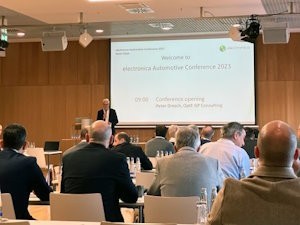electronica Automotive Conference: A stopover on the way to electronica 2024

Experts from the electronics industry discussed trends and challenges in vehicle architectures, new technologies and the entire supply chain in the automotive segment at the electronica Automotive Conference in Munich on December 7, 2023.
“Since the car is becoming increasingly digital, electronic components and software now play a hugely important role. With the electronica Automotive Conference, we offered the top experts in this fast-moving industry a platform to exchange ideas in the years between electronica,” as Katja Stolle, Deputy Executive Director for the New Technologies business unit at Messe München, explains. “The global automotive industry is undergoing a major transformation that entails significant changes for all companies in the value chain,” adds Peter Gresch, Chairman of the Program Committee and CEO of OptE GP Consulting. “That’s why the focus of electronica Automotive Conference 2023 was on bringing together specialists and managers from the entire supply chain for discussions.” Among them were representatives from Audi, BMW Group, Continental, Infineon Technologies, NXP Semiconductors, Robert Bosch, SAP, Wolfspeed, and ZF Group.
Electronics industry offers solutions
Azar Mottale, Director Mobility at the German Electrical and Digital Industry Association (ZVEI), which was part of the program committee, says: “The electrical and digital industry, with its members in the automotive supply industry, is an important solution provider on the path to sustainable, electrified and intelligent mobility, and is ready to actively help shape the next steps.” Accordingly, electronic components and parts for the automotive sector are also highly relevant at electronica: In 2022, around 1,000 exhibitors showcased products and solutions for this sector.
Top-class exchange
Despite difficult travel conditions, specialists and executives from the industry came together at the Messe München Conference Center North on December 7. They spent a day discussing topics such as software-based EE architectures, AI, the circular economy, and more. One conclusion was that the transition to the software-defined vehicle required the ability to continuously develop software independently of the hardware, including cloud solutions. In software development, in turn, generative AI had an enormous impact, as modern cars generate increasingly complex amounts of data that need to be managed. The discussion participants also agreed that the circular economy would be one of the most important topics in the industry in the future and require collaboration between different sectors in order to be successful. “The electronica Automotive Conference clearly showed that the impending transformation in mobility and the challenges it entails can only succeed together with all the partners in the automotive value chain,” as Azar Mottale sums up.
The discussion will be continued at electronica 2024 in Munich (November 12 to 15): At the next electronica Automotive Conference which takes place at November 11, 2024, as well as in the forum program with topics such as AI, 5G, power electronics, connectivity, cyber security, embedded, industrial, measurement technology and PCB & EMS.
Further information: electronica.de




